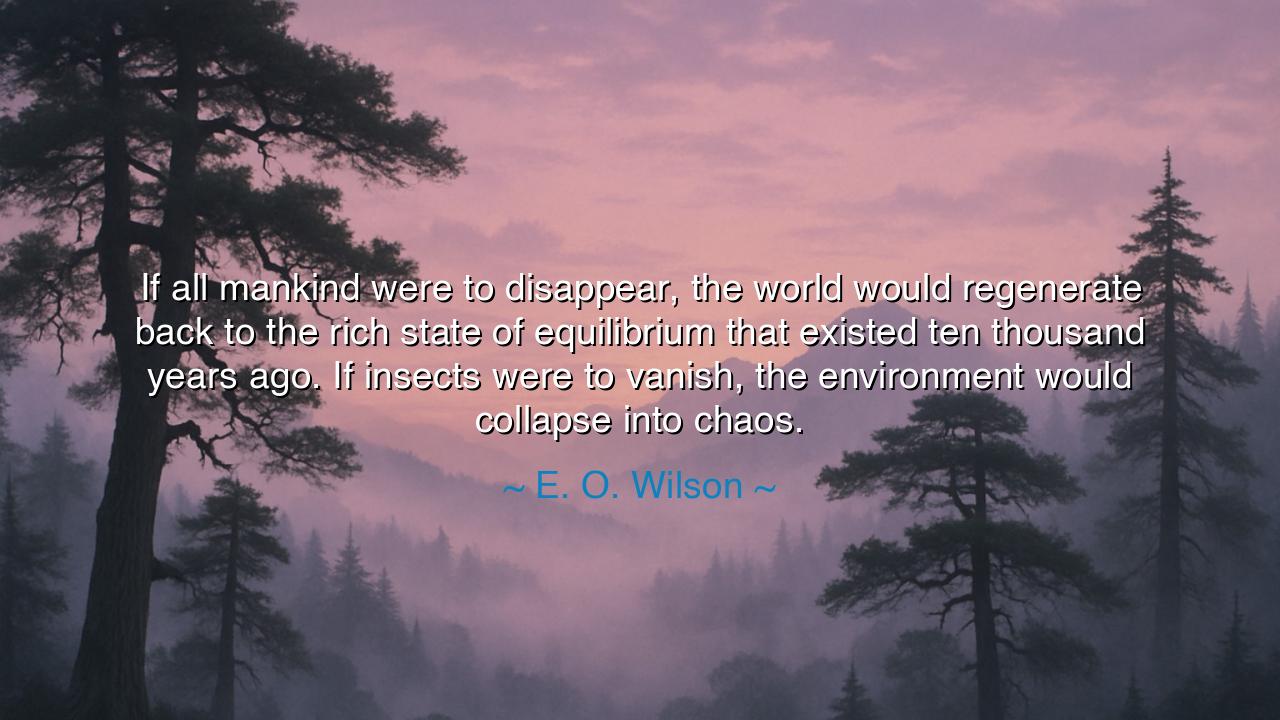
If all mankind were to disappear, the world would regenerate back
If all mankind were to disappear, the world would regenerate back to the rich state of equilibrium that existed ten thousand years ago. If insects were to vanish, the environment would collapse into chaos.






In the words of E. O. Wilson, the great biologist and sage of the living world, lies a truth both humbling and profound: “If all mankind were to disappear, the world would regenerate… If insects were to vanish, the environment would collapse into chaos.” This is no mere observation of science; it is a revelation of the balance that sustains creation itself. It is a reminder to humankind that we are not the masters of the Earth, but only one of its many fleeting guests—creatures woven into a vast and delicate web of life, whose harmony depends not on us, but on the smallest beings we so often overlook.
For in the unseen world, beneath the tread of our feet and beyond the reach of our pride, the insects labor as the silent architects of existence. They pollinate the flowers that become fruit, cleanse the land of decay, and feed the birds and beasts who, in turn, sustain the greater chain of life. They are the tireless keepers of equilibrium, working not for glory or reward, but for the rhythm of life itself. Without them, the Earth’s breath would falter, its rivers would rot, its forests would wither into dust.
And yet, humankind—so proud of its dominion—walks blind to this truth. We have paved the meadows, silenced the song of bees, and drowned the air in poisons of our own making. We have forgotten that nature does not need us to survive, but we need her utterly. When Wilson spoke of the world’s regeneration without us, it was not in malice, but in sorrowful clarity. The Earth, ancient and self-healing, would flourish once again in our absence, reclaiming what was taken, breathing deeply once more when the noise of humanity has faded.
History, too, whispers the same lesson. In the land of Chernobyl, where human hands withdrew after the great disaster, the wild returned in silence. The wolves, the elk, the birds—all came back, reclaiming what was once lost. The forests grew thick where once there was ruin. Though humankind had fled, life itself endured. This is the proof of Wilson’s vision—the Earth’s boundless will to restore balance when freed from our grasp. Yet, where the insects perish, even the wild cannot endure. The flowers fail, the fruits vanish, the soil grows sterile. The collapse comes not with a roar, but with a whisper, as life unravels strand by strand.
The wisdom of this quote, then, is a call to humility—to remember our place within the vast design. Mankind, with all its power and intellect, is not the center of creation, but a single thread in a cosmic tapestry. The insects, the forests, the rivers, and the winds are each sacred notes in the symphony of being. To harm one is to disrupt the harmony of all. The ancients knew this: they honored the bee as a messenger of the gods, the ant as a model of diligence, the butterfly as a symbol of rebirth. They saw holiness in the small and the fragile, for they understood that from such creatures springs the strength of the world.
Let us, then, awaken from the slumber of arrogance. Let us protect the smallest lives, for they are the pillars that hold up the great house of Earth. Plant gardens where bees may feed; shun the poisons that taint the soil; let the wild return where it has been banished. Teach the young that the world’s balance is not maintained by might, but by respect—respect for the humble, the unseen, the tiny guardians of our planet’s heartbeat.
The lesson of E. O. Wilson’s words is not despair, but renewal. The Earth, if tended with care, will not need to heal from us, but will heal with us. Let humanity strive not to dominate nature, but to serve her—to become once more a partner in her harmony. For when we learn to walk gently among the smallest of her creatures, we will rediscover the greatest truth of all: that life, in all its forms, is sacred, interwoven, and eternal—and that our survival depends not on what we conquer, but on what we preserve.






AAdministratorAdministrator
Welcome, honored guests. Please leave a comment, we will respond soon